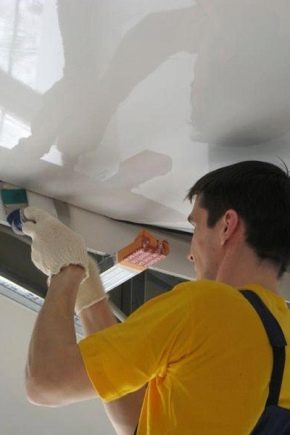Harpoon system for attaching stretch ceilings: pros and cons

Stretch ceilings are often used in the interior design of a room. One of the ways to install this design is a harpoon system.

Features, advantages and disadvantages
This method consists in the fact that special profiles are installed along the entire perimeter of the ceiling. They are rather thin elastic aluminum plates with a rubber insert. In section, the liner device looks like a bent fishing hook - a harpoon, hence the name of this fastening system.


The harpoon method has a number of advantages that make this system quite popular:
- The main advantage here is the absence of a gap between the wall and the canvas. The material fits snugly against the wall, without the need for masking tape.
- This method will be ideal for multi-level ceilings. To install them, you will not need to use additional inserts.
- Installation of the ceiling is fast enough, it only takes a couple of hours in time.
- The ceiling surface does not stretch and does not deform. The canvas is fastened securely, after installation there are no folds.
- The system can handle heavy loads. If the apartment is flooded on the floor below, you will not have to replace the canvas.
- The ceiling can be dismantled, if necessary, and then installed several times.
- This system practically does not "hide" the height of the room, therefore it can be used in rooms with low ceilings.


But this design also has several disadvantages:
- This system uses only PVC film. Cloth is not used because it practically does not stretch.
- We need an accurate calculation of the stretched canvas. It should be less than the ceiling area by only 5%.
- The harpoon profile is quite expensive. This is one of the most expensive stretch ceiling fixing methods.


How to mount?
- Ceiling installation begins with measurements. Accuracy is important here, so this procedure should be done by a professional. This is due to the fact that the web itself is welded to the harpoon even before installation, and there will be no opportunity to cut it.
- After all measurements have been made, it is necessary to cut off the canvas and weld a harpoon to it around the perimeter.
- At the next stage, an aluminum profile is mounted on the wall. Since the strips of most manufacturers already have holes for screws, you need to attach them to the wall, mark the places where you need to drill the wall, and install the profile.
- Further, using a mounting spatula, the harpoon is tucked into the profile and fixed on it. At this stage, the stretching of the canvas under the ceiling is carried out.
- Then the canvas is heated with a heat gun, thereby leveling it and taking the desired position.
- After all the work has been completed, technological holes are made in the ceiling and reinforcing inserts and lamps are installed.




Other systems and their difference
In addition to the harpoon method, bead and wedge mounting systems are often used.
In the first method, the canvas is attached to the profile using a wooden plank., which is called glazing bead, and then the edges are hidden under a decorative baguette. The advantage of such a system is that the accuracy of measurements is not important here, because the canvas is cut after it is attached to the profile. That is why an error upward is permissible.
The wedge system is similar in technology to the glazing bead system, but the blade is attached using special wedges. This system is indispensable when installing a ceiling in conditions of very uneven walls, since the profile used in this method is flexible enough, and all the flaws of the structure are hidden under the decorative side.

Reviews
Reviews of the harpoon system for attaching stretch ceilings are positive. Buyers who have installed such ceilings at home say that this installation method has increased reliability. Even after flooding and draining water from the structure, it regains its original appearance without any consequences. Such a ceiling does not inflate with temperature changes in the house, as is often the case in simple systems. But many regret the impossibility of installing fabric canvases with this method, and also believe that the cost of such a structure is unreasonably high.
You can learn more about the harpoon mounting system from the video below.













The comment was sent successfully.